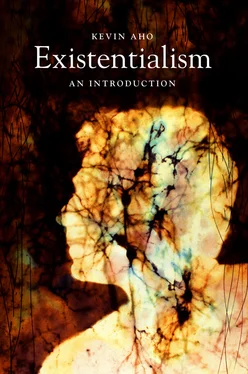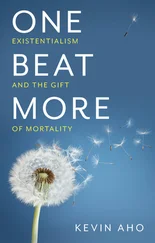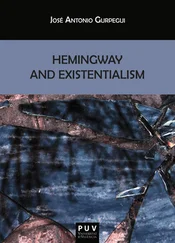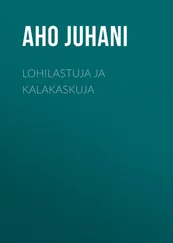Kevin Aho - Existentialism - An Introduction
Здесь есть возможность читать онлайн «Kevin Aho - Existentialism - An Introduction» весь текст электронной книги совершенно бесплатно (целиком полную версию без сокращений). В некоторых случаях можно слушать аудио, скачать через торрент в формате fb2 и присутствует краткое содержание. Год выпуска: 2013, ISBN: 2013, Издательство: Polity, Жанр: Философия, на английском языке. Описание произведения, (предисловие) а так же отзывы посетителей доступны на портале библиотеки ЛибКат.
- Название:Existentialism: An Introduction
- Автор:
- Издательство:Polity
- Жанр:
- Год:2013
- ISBN:978-0745651422
- Рейтинг книги:3 / 5. Голосов: 1
-
Избранное:Добавить в избранное
- Отзывы:
-
Ваша оценка:
- 60
- 1
- 2
- 3
- 4
- 5
Existentialism: An Introduction: краткое содержание, описание и аннотация
Предлагаем к чтению аннотацию, описание, краткое содержание или предисловие (зависит от того, что написал сам автор книги «Existentialism: An Introduction»). Если вы не нашли необходимую информацию о книге — напишите в комментариях, мы постараемся отыскать её.
Existentialism: An Introduction
Existentialism: An Introduction — читать онлайн бесплатно полную книгу (весь текст) целиком
Ниже представлен текст книги, разбитый по страницам. Система сохранения места последней прочитанной страницы, позволяет с удобством читать онлайн бесплатно книгу «Existentialism: An Introduction», без необходимости каждый раз заново искать на чём Вы остановились. Поставьте закладку, и сможете в любой момент перейти на страницу, на которой закончили чтение.
Интервал:
Закладка:
From these remarks, we can begin to see that existentialist freedom has nothing to do with Mersault's impulsive actions. As we saw in chapter 4, the distinctive attribute of being a person is self-consciousness, the ability to take a concrete stand on one's desires by interpreting them, giving them meaning, and seeing how they shape one's identity in the future as a law-abiding citizen, for example, or as a cold-blooded murderer. If Mersault is acting only on ‘first-order’ impulses, he is what Harry Frankfurt calls a ‘wanton’ and not a self; he is not yet free because his action is not mediated by the desire to be the person that he wants to be. As we have shown, it is only when we act on these higher ‘second-order’ volitions that we are truly free and responsible because these actions transcend the determinations of our impulses in a way that orients us in the world and gives shape and coherence to our identities as a whole.
Of course, we are still unable to judge whether or not Mersault's actions are objectively ‘good’ or ‘evil,’ but we can certainly determine whether or not he is being honest with himself to the extent that he makes no excuses and understands that his actions make him who he is. “One can still pass judgment,” writes Sartre, “one can judge … that certain choices are based on error and others on truth. If we have defined man's situation as free choice, with no excuses and no recourse … every man who takes refuge behind the excuse of his passions … is a dishonest man” (2001, 305). If you deny your freedom and responsibility, the existentialist can judge you as being dishonest because, on the basis of your actions and self-interpretation, “that's what you are” (306). If, however, you are willing to own up to your choices and actions, then the image of the existentialist as an ‘anything goes’ anarchist falls apart. We see that, as self-conscious beings, we are not free from the consequences of our actions or from being responsible for what we do. The inescapability of human freedom and responsibility becomes the basis for existentialist ethics. This is why Beauvoir says that “to will oneself moral and to will oneself free are one and the same decision” (1948, 24).
Sartre goes on to claim that the commitment to human freedom is not only for one's own sake. Indeed, his position takes a distinctively Kantian turn by emphasizing how owning up to and affirming the value of human freedom involves a kind of universalizability, because it entails affirming the value of freedom for all of humankind. In ‘Existentialism is a humanism,’ Sartre puts it this way:
We want freedom for freedom's sake and in every particular circumstance. And in wanting freedom we discover that it depends entirely on the freedom of others, and that freedom of others depends on ours. Of course, freedom as the definition of man does not depend on others, but as soon as there is involvement, I am obliged to want others to have freedom at the same time that I want my own freedom. (2001, 306)
Although it is difficult to square this position with his claim in Being and Nothingness that human relations are a ceaseless struggle for self-assertion — as I try to assert my freedom and objectify others and they try to do the same to me — we can see what Sartre is aiming at. We create ourselves through our choices but our choices don't just involve ourselves because they always take place in relation to others, creating a particular image or picture of the kind of person we think others should be. Sartre writes, “In creating the man that we want to be, there is not a single one of our acts which does not at the same time create an image of man as we think he ought to be” (293). In good faith, I acknowledge freedom as my essence, and, in doing so, I cannot help but acknowledge that it is the essence of others as well. And if the cultivation of my own free projects is the ultimate aim and good of my life, then my actions “involve all of mankind” (304) in the sense that they should in some way cultivate this possibility for others (Barnes 1967, 61–62). Sartre is unclear about how exactly I can move from an authentic recognition of my own freedom to the moral consideration of cultivating freedom for others, but we can look to Heidegger's conception of ‘solicitude’ ( Fürsorge ) for guidance.
In Being and Time , Heidegger describes two modes of what he calls “positive solicitude” (1962, 157), referring to the ways in which we are actively concerned for others. On the one hand, I can ‘ leap in ’ for the other. In this mode of concern, I decide for the other what they should do and how they should act and thus ‘disburden’ them of their freedom and from taking responsibility for their own lives. Here we can imagine the overprotective mother whose daughter is going off to college. The mother ‘leaps in’ for the daughter by telling her what discipline to major in, what kind of roommate she should have, and what neighborhood she should live in. She is preoccupied with her, constantly checking in with phone calls and text messages. She even gives her a living allowance and pays her tuition. The daughter interprets this behavior as a manifestation of a mother's love, but it is actually a kind of tacit “domination” (158). The mother's concern for her daughter is inauthentic because she is manipulating and controlling her as if she were a thing. As a result, the mother is ‘taking over’ her daughter's possibilities for her. The daughter is stripped of her freedom so that she is unable to choose and take responsibility for her own life.
Heidegger contrasts this inauthentic concern with what he calls authentic or ‘liberating solicitude.’ In this mode, the mother does not ‘leap in’ for the daughter but ‘leaps ahead’ of her. Leaping ahead signifies that the mother does not care for her daughter as if she were a dependent thing to be sheltered. She is concerned, rather, with granting her daughter freedom so that she can face herself as a ‘ being possible ’ who alone is responsible for creating her own identity. The mother does this “not in order to take away [her] ‘care’ but rather to give it back to [her daughter] authentically as such for the first time” (159). For Heidegger, “this kind of solicitude pertains essentially to authentic care. … It helps the Other to become transparent to [herself] in [her] care and to become free for it” (159, my brackets). In this way, the mother plays the role of “conscience” in the sense that she calls her daughter to “know [herself]” (159, my brackets), to anxiously confront her own self-responsibility. Being concerned for her daughter's freedom, then, is not the same as being concerned for her material welfare. The latter issue is best served by means of ‘leaping in’ and ‘taking over’ her possibilities for her. Although they are not mutually exclusive, the aim of liberating solicitude has nothing to do with her daughter's happiness, protection, or good health but with granting her the freedom to create and take responsibility for her own life. From this, we can say that there is a universal value espoused by existentialists when it comes to being-with-others. It is to care for the other by releasing them, by letting them ‘become free.’
In positing freedom as a universal value, existentialists are clearly indebted to Kant. The difference is in Kant's claim that freedom and reason are intimately connected, and that, insofar as we are moral agents, reason always serves as the ultimate authority and justification for our actions. As Kant says, “Free will is a kind of causality belonging to living things so far as they are rational ” (1964, 114, my emphasis). The universality that is distinct to reason provides a binding necessity to act on the basis of duty to the ‘moral law’ rather than on one's own heteronomous inclinations. Freedom, on this account, has nothing to do with being allowed or permitted to choose and do what one wants but to be self-regulated and duty-bound to the law by means of reason. Existentialists make no such claim. Indeed, as we saw in chapter 5, existentialist freedom can be understood as freedom from the authority of reason and from universal laws; it is the freedom to be ‘irrational,’ ‘unnatural,’ and ‘irreverent’ if that is what matters and is of value to you as an existing individual. As Dostoevsky's underground man reminds us, “Reason is an excellent thing, there's no disputing that, but reason is nothing but reason and satisfies only the rational side of man's nature” (2009, 21). Freedom, on the other hand, may result in “destruction, chaos, [and] suffering” (23) because it involves the choices of the whole person , not just the rational part, and “even it goes wrong, it lives ” (93).
Читать дальшеИнтервал:
Закладка:
Похожие книги на «Existentialism: An Introduction»
Представляем Вашему вниманию похожие книги на «Existentialism: An Introduction» списком для выбора. Мы отобрали схожую по названию и смыслу литературу в надежде предоставить читателям больше вариантов отыскать новые, интересные, ещё непрочитанные произведения.
Обсуждение, отзывы о книге «Existentialism: An Introduction» и просто собственные мнения читателей. Оставьте ваши комментарии, напишите, что Вы думаете о произведении, его смысле или главных героях. Укажите что конкретно понравилось, а что нет, и почему Вы так считаете.












